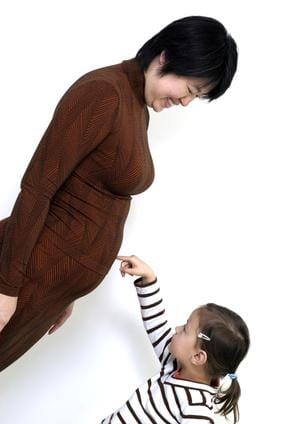If you are trying to get pregnant after the age of 35, it generally triggers the need for additional medical testing and supervision. Most pregnant women over 35, however, have healthy pregnancies and deliveries. Finding out you are pregnant past the age of 35 can sometimes be a surprise, but if you know what symptoms to look for, it will help you decide when it is time to take a pregnancy test.
Mid-Cycle Spotting
Cramping and light spotting approximately six to 12 days following conception is a common pregnancy symptom, according to the American Pregnancy Association. This is caused when the embryo burrows into the uterine wall. Although all women do not have any reaction to this, some do experience light bleeding or light cramping.
Tender Breasts
Changes in the size and feel of your breasts are an early sign of pregnancy, according to the Mayo Clinic. Approximately two weeks after conception, your breasts will begin to feel fuller. In addition, you may experience a vague soreness or tingly feeling. This is caused by your milk ducts beginning to get ready for breastfeeding.
Nausea
Many women experience nausea during the first trimester of pregnancy. The nausea is sometimes, but not always, associated with vomiting. Although it is often referred to as morning sickness, it can actually strike at any time and can be triggered by tastes or smells or seem to have no trigger at all. It typically starts approximately two weeks after you have conceived and is caused by the increase in estrogen.
Fatigue
Pregnancy causes your progesterone levels to rise, which, in turn, can cause extreme fatigue early in your pregnancy. This increase in progesterone is coupled with a decrease in blood sugar and blood pressure which also contributes to the severe fatigue you may experience early in the pregnancy.
Increased Basal Body Temp
Between ovulation and your next monthly cycle, your early morning or basal temperature will be slightly elevated. Many women over the age of 35 who are trying to conceive chart their daily basal temperature to determine ovulation. If you are charting yours and it remains elevated for two weeks or longer, you may be pregnant.
Photo Credit
- maman et moi 13 image by Nathalie P from Fotolia.com





